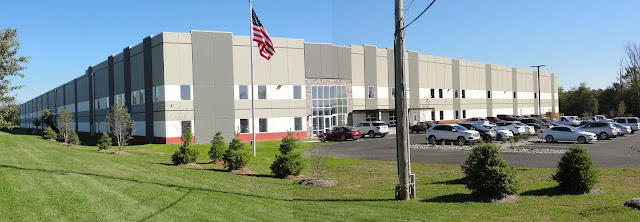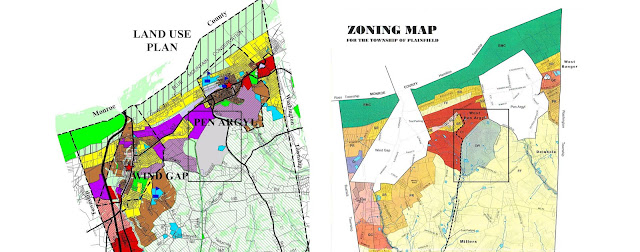Election topic: Attracting new businesses to Plainfield Township
In a certain circle in this area of the Slate Belt, you will hear grumbling that "Plainfield Township is not friendly to new businesses." This false claim was repeated by Bob Cornman, another of the candidates in the election for township supervisor in an article published a few days ago in the Morning Call. This is a narrative that simply does not fit the facts.
Exhibit A is the newly constructed ASGCO Headquarters building at 730 Bangor Road, Plainfield Township, the site of the former NICOS Polymers Recycling business. ASGCO is a light manufacturer of conveying products, and this site is in the township's light industrial zoning district. The NICOS Polymers bulk recycling business was previously located here. NICOS had constructed a spec building permitted as a "Commercial Use", and did not originally intend to have a bulk recycling use - which is not permitted in the light industrial district. After the NICOS building was destroyed by fire, an industrial gas manufacturer later proposed to redevelop the site. Their use was to be 100% chemical gases, many highly hazardous, and chemical products are also not a permitted use at this site. They failed to obtain approval, and withdrew their application.
I attended both the Site Plan and Land Development Plan reviews for ASGCO's project, and each was completed within a few meetings. While the site does not have access to public sewer, an innovative drip irrigation solution was implemented. Storm water concerns were addressed, as this site has runoff down steep slopes towards the Little Bushkill Creek. There were no major issues of contention. This business will support 50 to 70 good quality jobs.
About seven years ago, ASGCO renovated and developed the former Hi-Pure Chemicals site nearby on Engler Road. Hi-Pure was a nonconforming use that began just prior to zoning, and after closure extensive remediation was done to make the site safe for redevelopment. Years later, a dry chemical grinding business and two wood pellet plant operations followed - none of which were permitted in the light industrial district. A pallet grinding business that makes mulch then proposed to locate on the site, as well as the same chemical grinding business that had previously been located there. Since neither of these businesses were permitted, they withdrew their applications. ASGCO then proposed and completed converting the premises into their machine shop, a permitted use providing 20 good quality jobs. There were no major issues during the review phase of the project.
To see the possible consequences of locating businesses in zoning districts where they are not permitted, the best example is the Concept Sciences tragedy in Hanover Township, Lehigh County. An investigation yielded the recommendation that such a facility not be placed in a light industrial zone. Interestingly, Concept Sciences application to locate in neighboring Hanover Township, Northampton County, had been denied because their use was not permitted in the light industrial zone.
Currently, proposals to develop four warehouses in Plainfield Township are under consideration by the Planning Commission. In the past five years, a warehouse was built on Jacobsburg Road, two warehouses have been approved on sites between Rt 512 and Male Road, and a industrial park was approved for the Beers property. A 37,000 square foot warehouse is said to be proposed on the latter.
Warehouses are a permitted use in the zoning districts in which all these are located. The SALDO has certain requirements for warehouses, including options for traffic and environmental studies. The Lehigh Valley Planning Commission signs off on storm water management for all such projects in the county.
Traffic studies are important; the CRG proposal for two warehouses on the former railroad property between Wind Gap and Pen Argyl estimates 1900 trucks a day, and over 200 per hour at peak periods. For a warehouse proposed between the Recreation Trail along Gall Road and Bangor Road, access would be via an easement across the Four Slide property, onto Bangor Road. Whether trucks will turn on and off Belfast Road, or travel south through Stockertown, is a critical detail that will be addressed. The fourth proposed warehouse is on the former Galley Restaurant property.
In 2021, Franklin Hills Winery obtained approvals to construct a winery, tasting room/restaurant and distillery a half mile north of ASGCO on Bangor Road. Like ASGCO, the approvals process was straightforward and did not take more than a few meetings for the Site Plan and Land Development phases. A few years ago, a new dog training and boarding facility opened in a newly constructed building on Youngs Hill Road. These approvals are just a sample.
If Plainfield Township is "unfriendly to business," it is not evident by the number of applicants applying to develop properties in Plainfield Township, and those being approved.
There are businesses that find out that their proposals do not meet the zoning ordinance and/or SALDO, and fail to obtain approval. Consider Synagro's proposal to locate a sludge drying plant on Waste Management property in 2016. Their first Site Plan, promoted by Green Knight Economic Development Corporation Vice President and Synagro Project Manager Bob Cornman, proposed to locate the plant on land Waste Management uses for recycling in the commercial industrial district. Synagro's use was specifically permitted only in the solid waste district. Mr. Cornman should have known this, since the Planning Commission he served on for over 20 years maintains the township's zoning ordinance. Mr. Cornman previously advocated to place the Green Knight Energy Center on the very same site 17 years earlier, and that failed because the Energy Center was also permitted only in the solid waste district. Mr. Cornman should have known the Synagro plant could not possibly be placed where proposed. So should the Zoning Officer, who had to be alerted to this fact after the first review meeting. The Zoning Officer had a lengthy history of using catchalls to allow uses that were not permitted - he determined Synagro's use was "recycling," (!) and in the case of the industrial gas facility, he called that use "warehousing". A Zoning Officer must choose the closest use listed in the ordinance to the one proposed. Imagine ignoring that a use is 100% chemical products, and just considering the products are boxes in a warehouse. Additional ordinance requirements that apply to chemical uses would not be triggered.
Mr. Cornman and Green Knight then supported a new Synagro proposal, to site near a large quarry pond in the solid waste district, where the use is permitted. Synagro failed to supply an environmental impact statement requested by the Planning Commission, a principal reason that the Planning Commission ultimately recommended the Board reject Synagro's proposal. The Board agreed with the recommendation. While Mr. Corman touts his credentials as the current Environmental Advisory Counsel Chairman, he only has this position due to the long time Chairman who presided over multiple award winning achievements recently resigning. One would expect that someone who is concerned about the environment, and who was the Synagro Project Manager for Green Knight, would have pressured Synagro to provide the environmental study as the Planning Commission had requested, so that the waters in and connected with the quarry would be protected. But Mr. Cornman remained silent.
Green Knight, including its Vice Chairman and Project Manager Bob Cornman, enthusiastically supported the Synagro proposals, despite the first one being on an inappropriate site, and the second one being drawn out for over a year by Synagro stonewalling repeated requests for more information. Mr. Cornman and like-minded individuals may consider that the rejection of Synagro is yet another example that "Plainfield Township is closed for business," (another form of the claim) but the fact is that businesses that are either not permitted or can not satisfy ordinance requirements that apply to all applicants should not be granted approval. Supervisor Hurni, who is also a Green Knight board member, has stated multiple times that "We (Plainfield Township) should do what we say we are doing are on paper," and I agree. All applicants must be treated the same way, and to the same standards. For over 20 years as a Planning Commission member, Mr. Cornman never objected to the township's procedures, or asked that ordinances be relaxed. Now that he is running to be a supervisor, he has suddenly adopted the false mantra that the township is unfriendly to new businesses.
Regarding rezoning for a new landfill, Green Knight wrote a letter supporting it, despite no citizen speaking in favor of rezoning during public meetings in 2020 on the subject. Two lawsuits were filed in 2019 over odors from the landfill. Green Knight and Mr. Cornman may be assuming that Plainfield Township is "closed for business" because neither the community or its leadership share Green Knight's vision of expanding solid waste uses for several decades into the future - including another landfill and the option for a sludge plant. While a claim is being circulated by a landfill representative that if they obtain rezoning, they would pledge not to host a sludge plant, a landowner can pursue all permitted uses by state law; this right can not be forfeited through such a pledge. And imagine the howls of "closed for business!" if the township tried to hold an Applicant to such a hypothetical pledge in the future.
To sum up, the best way to attract new businesses, good businesses, to Plainfield Township is to follow our ordinances. If you allow nuisance businesses to locate in a zoning district where not permitted, in violation of the ordinance, conflicts arise between uses. But worse, since the township has very little land zoned for commercial and light industrial uses, allowing businesses into the wrong sites means those sites are not available for good businesses with good jobs - like ASGCO. Good businesses make good neighbors and beget good businesses. Furthermore, when a project with tremendous potential for environmental impacts such as Synagro's is proposed, an Environmental Impact Statement must be expected. If the Applicant refuses, then they should expect to not achieve approval.




Comments
Post a Comment